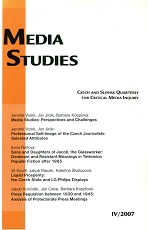Sons and Daughters of Jacob, the Glassworker: Dominant and Resistant Meanings in Television Fiction after 1985
Sons and Daughters of Jacob, the Glassworker: Dominant and Resistant Meanings in Television Fiction after 1985
Author(s): Irena ReifováSubject(s): Social Sciences
Published by: Univerzita Karlova v Praze, Fakulta sociálních věd
Keywords: ideology; communism; television; television series; history; textual orientator; essentialism; modernity
Summary/Abstract: This article explores the TV series "Synové a dcery Jakuba skláře" (Sons and Daughters of Jacob, the Glassworker) as an item of popular television fiction produced and broadcasted by the Czechoslovak television in 1980s. Consequently, it examines the series production and textual categories in their connection to the communist ideology. The concept of ideology is also reviewed with an eye to its development in cultural studies in last two decades. The series represents a form of film historiography as it covers almost sixty years of Czechoslovak history from 1899 to 1957. The textual content is examined from the methodological perspective of textual orientators – narrative features that refer to the historical reality and simultaneously also refer to the moment of production by paradigmatic choices. Ideological choice of the textual orientators is seen in an ascribed role of the social democratic party and the communist party, as well as in the division of two communist period phases: times of struggle and times of power. However, the central textual category is disconnected from the communist ideology. It represents the universal modernist essentialism and postulates the inner human qualities (in contrast to the surface) as a marking sign of main good characters.
Journal: Mediální studia
- Issue Year: 2/2007
- Issue No: 04
- Page Range: 376-415
- Page Count: 40
- Language: English

